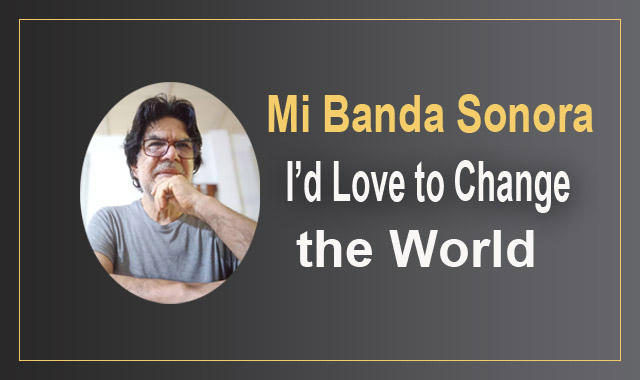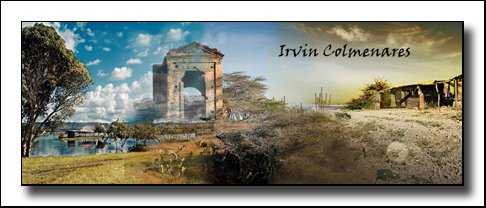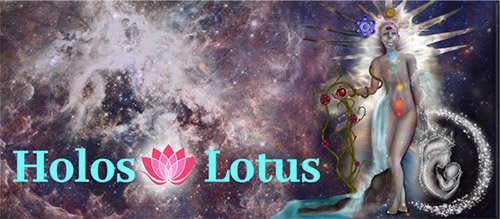Mi banda sonora. I’d Love to Change the World | My soundtrack. I’d Love to Change the World

No deja de maravillarme la cantidad de formas en que uno se puede encontrar con una canción.
En estos días el muchacho que me ayuda con ciertos trabajos de albañilería en la casa estaba pegado, como casi siempre que está haciendo alguna tarea, a sus audífonos.
Suele escuchar la música a un volumen bastante alto, y aunque muchas veces le he hablado de lo nocivo que puede ser ese mal hábito para sus oídos, él no me hace caso. De allí que cada vez que me acerco me resulta inevitable escuchar algo de lo que tiene sonando en su cell.
En una de esas que me acerqué escuché una melodía muy conocida para mí. Le pregunté qué estaba escuchando y con toda la naturalidad del mundo me respondió: Ten Years After.
Su respuesta realmente me sorprendió, que un muchacho como él que anda apenas en los veinticuatro años estuviera escuchando a una de las bandas británicas más importantes de los años setenta era completamente atípico. Lo normal es que estuviese pegado a algún reguetón, bachata, o cualquiera de esos ritmos más modernos que suelen escucharse en las camionetas de pasajeros.
Con la curiosidad a flor de piel me fue inevitable preguntarle cómo era que a él le gustaba esa música ya un poco vieja, de otro tiempo. Debo reconocer el prejuicio que guiaba mi pregunta, porque ciertamente la música es un lenguaje universal y como tal puede ser completamente atemporal, pero es que ese tipo de música no es frecuente que circule por la radio convencional, por lo menos en la ciudad donde vivo.
Me comentó que a su padre, un hombre de sesenta años, le encantaba esa música de los años sesenta y setenta. Que tenía una gran colección de discos de vinil y cd que por cuestiones de la tecnología ya no escuchaba, pero que en unos pendrives mantenía ese tipo de música. Era lo que él había escuchado desde niño y quizá por eso le gustaba. También me comentó que un de las canciones preferidas de su padre era precisamente I’d Love to Change the World, la que yo había escuchado a través de sus audífonos.
Satisfecha mi curiosidad dejé que mi joven amigo continuara haciendo la tarea que era preferible concluir antes de que fuese a llover, algo muy común en estos días de agosto. Pero ya la canción había surtido el efecto de remover los mecanismos de mi memoria.

I’d Love to Change the World, fue una de esas canciones icónicas para mi generación. Fue lanzada en el año 1971, para ese momento yo tenía diecisiete años, había terminado el liceo y me preparaba para iniciar los estudios del Pedagógico de Caracas.
La canción sintonizaba plenamente con el clima cultural de aquellos tiempos. En esos años el mundo Occidental respiraba una atmósfera de rebeldía, tanto en los Estados Unidos, como en Europa, e incluso América Latina, había movimientos juveniles que se rebelaban contra lo que a su juicio eran las injusticias de los gobiernos liberales.
La realidad del momento es que el pensamiento de izquierda estaba en alza. Para una gran parte de los jóvenes del mundo, entre los que me incluía yo, los ejemplos a seguir estaban en Rusia, China comunista, y Cuba.
Claro, que unos años después vendría el gran desencanto, muchos nos daríamos cuenta que todos aquellos modelos no representaban realmente nada bueno a lo que aspirar. Ni había en ellos más justicia, ni más libertad, ni menos pobreza, ni las personas recibían un trato más humano… De todo eso hablaba de forma un poco criptica la canción de Ten Years After.
Sin embargo, y a pesar de la distancia, mucho se puede rescatar de aquellos mensajes de I’d Love to Change the World, porque ciertamente en nuestros días siguen planteadas la resolución de muchos de aquellos problemas.
Pero más allá de la lírica, la canción que les comparto hoy, tiene un espectacular arreglo musical. Es una de esas canciones donde la guitarra tiene un excepcional protagonismo.
Desde el inicio del intro y hasta la segunda o tercera estrofa la guitarra acústica, acompañada por la batería y el bajo va haciendo todo el trabajo. Acompañan en perfecta armonía la voz potente y singular de Alvín Lee, el mismo guitarrista que toca toda la canción.
Luego de esos compases iníciales se intercalan las intervenciones de la guitarra eléctrica, en la que más bien pareciera que lo que sonara fuese un instrumento de cuerda frotada, como un violín.
Y es que Alvín Lee, quien fue uno de los grandes guitarristas del rock, ayudado, sin duda, por algún aparato de efectos de sonido, tenía la cualidad de generar ese sonido maravilloso en el que podía extender la nota tal como se hace en los instrumentos de cuerda frotada. Esa manera particular de tocar la guitarra fue su marca de fábrica y probablemente influyó en muchos guitarristas posteriores.
La canción funcionaba perfectamente para ser escuchada en las grabaciones, pero no así en las presentaciones en vivo. Había partes donde las dos guitarras, acústica y eléctrica se solapaban, y esto es realmente muy difícil de lograr por un solo guitarrista en una presentación en vivo. Ni siquiera tocando con ambas guitarras colgadas al cuello es fácil lograrlo. Por eso Ten Years After casi no la tocaba en directo.
A más de cincuenta años de su lanzamiento, todavía este gran tema, que expresaba las frustraciones de una generación, "a la que le encantaría cambiar el mundo, pero que no sabía cómo hacerlo…" continúa emocionando muchos corazones…
Es muy probable que alguno de ustedes haya escuchado este gran clásico de la historia del Rock. Sí no, los invito a que le presten atención.
Gracias por tu tiempo.


I never cease to be amazed at the many ways one can encounter a song.
These days, the young man who helps me with certain masonry jobs around the house was glued to his headphones, as he almost always is when he’s doing a task.
He usually listens to music at a fairly high volume, and although I have often told him how harmful that bad habit can be for his ears, he doesn't listen to me. So every time I go near him, I inevitably hear something playing on his cell phone.
On one of those occasions, I heard a melody that was very familiar to me. I asked him what he was listening to, and he replied with complete naturalness: Ten Years After.
His answer really surprised me. It was completely atypical for a guy like him, barely 24 years old, to be listening to one of the most important British bands of the 1970s. Normally, he would be listening to reggaeton, bachata, or any of those more modern rhythms that are usually heard in passenger vans.
My curiosity piqued, I couldn't help but ask him how he came to like music that was a bit old, from another era. I must admit that my question was guided by prejudice, because music is certainly a universal language and as such can be completely timeless, but that type of music is not often played on conventional radio, at least in the city where I live.
He told me that his father, a man in his sixties, loved that music from the sixties and seventies. He had a large collection of vinyl records and CDs, which he no longer listened to due to technological advances, but he kept that type of music on flash drives. It was what he had listened to since he was a child, and perhaps that was why he liked it. He also told me that one of his father's favorite songs was I'd Love to Change the World, the one I had heard through his headphones.
My curiosity satisfied, I let my young friend continue with the task that needed to be finished before it started raining, something very common in August. But the song had already had the effect of stirring the mechanisms of my memory.

I'd Love to Change the World was one of those iconic songs for my generation. It was released in 1971, when I was seventeen, had finished high school, and was preparing to begin my studies at the Pedagogical University of Caracas.
The song was fully in tune with the cultural climate of the time. In those years, the Western world was breathing an atmosphere of rebellion. In the United States, Europe, and even Latin America, there were youth movements rebelling against what they considered to be the injustices of liberal governments.
The reality of the moment was that leftist thinking was on the rise. For a large part of the world's youth, myself included, the examples to follow were in Russia, communist China, and Cuba.
Of course, a few years later, the great disillusionment would come, and many of us would realize that all those models did not really represent anything good to aspire to. There was no more justice, no more freedom, no less poverty, and people were not treated more humanely... The Ten Years After song spoke of all this in a somewhat cryptic way.
However, despite the distance, much can be salvaged from those messages in I'd Love to Change the World, because certainly in our day the resolution of many of those problems is still on the table.
But beyond the lyrics, the song I'm sharing with you today has a spectacular musical arrangement. It's one of those songs where the guitar plays an exceptional role.
From the beginning of the intro to the second or third verse, the acoustic guitar, accompanied by the drums and bass, does all the work. They accompany in perfect harmony the powerful and unique voice of Alvin Lee, the same guitarist who plays the entire song.
After those initial bars, the electric guitar comes in, sounding more like a bowed string instrument, such as a violin.
Alvin Lee, who was one of the great rock guitarists, undoubtedly aided by some sound effects device, had the ability to generate that wonderful sound in which he could extend the note as is done on bowed string instruments. That particular way of playing the guitar was his trademark and probably influenced many later guitarists.
The song worked perfectly when listened to on recordings, but not so well in live performances. There were parts where the two guitars, acoustic and electric, overlapped, and this is really very difficult for a single guitarist to achieve in a live performance. Even playing with both guitars slung around the neck, it is not easy to achieve. That's why Ten Years After hardly ever played it live.
More than fifty years after its release, this great song, which expressed the frustrations of a generation that would love to change the world but didn't know how to do it, continues to touch many hearts...
It is very likely that some of you have heard this great classic in the history of rock. If not, I invite you to give it a listen.
Thank you for your time.
Translated with DeepL.com (free version)








Comunidad Be Entrepreneur

Hola @irvinc, un hermoso recuerdo de una época que con todas sus contradicciones género cambios importantes y que la música como señalas, con su lenguaje universal expandía los conceptos sociales que movían al mundo.
Una gran reseña.
Me alegra que te haya gustado la publicación, es un gran tema. Gracias por pasar y comentar estimdada @damarysvibra. Un fuerte abrazo desde Maracay.
Do you want to get involved? Do you want to support music and this project? Follow us to keep you updated and read our Introduction post!
🎶 Join us on our Discord Server! 🎵
Thank you so much for the support.
My friend @irvinc for me music is a way to travel to the past, in this opportunity I see my older brothers with long hair, flared pants, dancing or sitting listening to music with a record player, which almost always, the needle broke,
ha, ha, ha, ha
I think this band Ten Years After, became known in the famous Woodstock festival.
A hug
P.S. My older brother used to iron his hair. Ha, ha, ha, ha
Yes, my dear Rebeca, for me it's also a way of keeping the memory alive. Like your brothers, I also wore bell-bottoms and long hair, hahaha. Wonderful times. Thanks for stopping by and for the support. A big hug from Maracay.